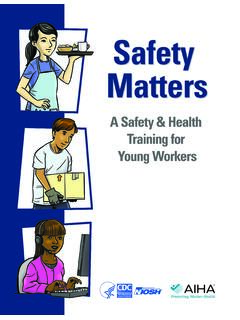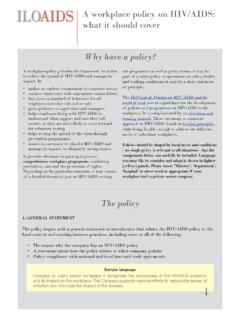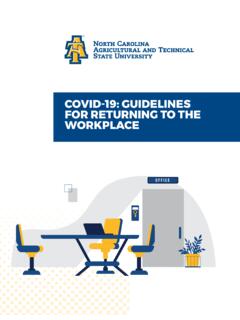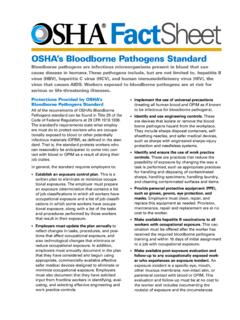Transcription of Equality Act 2010: Duty on employers to make reasonable ...
1 Equality Act 2010. Duty on employers to make reasonable adjustments for their staff This guidance is aimed at businesses to help them understand what adjustments they are required to make for disabled employees and job applicants. Of course, individual circumstances may vary and employers need to act in accordance with their legal obligations. Summary Where someone meets the definition of a disabled person in the Equality Act 2010 (the Act). employers are required to make reasonable adjustments to any elements of the job which place a disabled person at a substantial disadvantage compared to non-disabled people.
2 employers are only required to make adjustments that are reasonable . Factors such as the cost and practicability of making an adjustment and the resources available to the employer may be relevant in deciding what is reasonable . Further useful information can be found at the end. Please note that this is general guidance only and cannot by its nature deal with all circumstances. It is always best for you to take your own, independent legal advice if you are unsure of your obligations in specific circumstances. Definition of disability under the Act The general definition of disability for the purposes of the Act is a physical or mental impairment which has a substantial and long-term adverse effect on a person's ability to carry out normal day-to- day activities.
3 The Act defines long-term in this context as having lasted, or being likely to last for at least 12 months or the rest of the person's life. Substantial is defined as more than minor or trivial. Some people are deemed to be disabled for the purposes of the Act. For example, people with cancer, HIV and multiple sclerosis are protected effectively from the point of diagnosis. 2. When does the reasonable adjustment duty apply? The duty to make reasonable adjustments arises in three situations: where a provision, criterion or practice applied by or on behalf of the employer, where a physical feature of premises occupied by an employer, or where the lack of an auxiliary aid, places a disabled person at a substantial disadvantage compared with people who are not disabled.
4 An employer has to take such steps as it is reasonable to take in all the circumstances to avoid that disadvantage in other words the employer has to make a reasonable adjustment'. Does the reasonable adjustment duty apply to my recruitment practices as well as to the arrangements for my existing staff? Yes. Recruiting new employees and reasonable adjustments Some application processes may involve assessment tests or interviews. These processes should not unreasonably disadvantage disabled people. Section 60 of the Equality Act is particularly important as regards what you can and can't ask about the disability of an applicant when recruiting: You can ask questions about disability at an early stage in the application process, so that you can establish whether an applicant will be able to comply with a requirement to undergo an assessment test, or to establish whether you must make reasonable adjustments for an applicant in relation to an assessment.
5 For example, if you require applicants to sit an assessment on a desktop computer you can ask if they are able to do that or whether they require any auxilliary aids to do so (if they can be reasonably provided). You can ask questions about whether the applicant will be able to carry out functions that are intrinsic to the job (having made any reasonable adjustments), for example, whether an applicant has the necessary physical capabilities or physical fitness to do the job, or whether their health meets certain standards for legitmate safety reasons.
6 You can also ask questions about disability in other limited situations, for example, for legitimate monitoring of the diversity of job applicants or if you need someone with a specific disability to do the job. But aside from those circumstances you can't ask questions about the health of an applicant before offering him or her the job. That said, it is not unlawful for you to offer an applicant a job that is conditional upon him or her passing an occupational health check. In this situation, if the results are that the successful candidate has a disability that affects his or her ability to do the job, the question will then be whether a reasonable adjustment can be made to deal with that.
7 If a reasonable adjustment cannot be made, it would then be legitimate to withdraw the job offer on the grounds that the applicant has not met the required condition. 3. Does the disabled person need to make clear what adjustment is needed? In a situation where you may be under an obligation to make a reasonable adjustment, you and the disabled person obviously need to discuss their circumstances so that you can establish what is needed. However the question of what is a reasonable adjustment is an objective one. It does not mean you must comply with every requirement asked of you by the disabled person.
8 The issue will be what you can reasonably do to avoid any disadvantage entailed by his or her disability. For example, a disabled employee might request that you build a special ramp for wheelchair access to your offices. Having considered this you might decide it to be unfeasible in cost and practical terms to make structural alterations to the building, but you might decide that you can have a temporary ramp available and someone ready to assist with entry and exit to the building. In doing so you would have complied with the law because you provided a workable solution that is reasonable in the circumstances.
9 Equally, if it is clear that there isn't an adjustment that can reasonably be made to avoid a disadvantage , then you can lawfully decline the request. What adjustments might I have to make? The Act does not list the sorts of adjustments that you might have to make, but examples might be: providing recruitment literature in large print;. providing in interview situations extra equipment at reasonable cost, removing movable barriers like furniture, or holding the interview in a different, wheelchair accessible room;. allowing a guide or hearing dog into the workplace.
10 Purchasing specialist equipment, such as an ergonomic chair;. discounting disability-related sickness leave for the purposes of absence management;. providing additional supervisory guidance / support;. including a disabled parking space in the car park;. allowing different start and end times to the working day. What if I can't afford to make a particular reasonable adjustment, or if it's not practical for me to do it? You are only required to make adjustments that are reasonable in all the circumstances. Factors such as the cost and practicability of making an adjustment and the resources available to you may be taken into account in deciding what is reasonable .
















